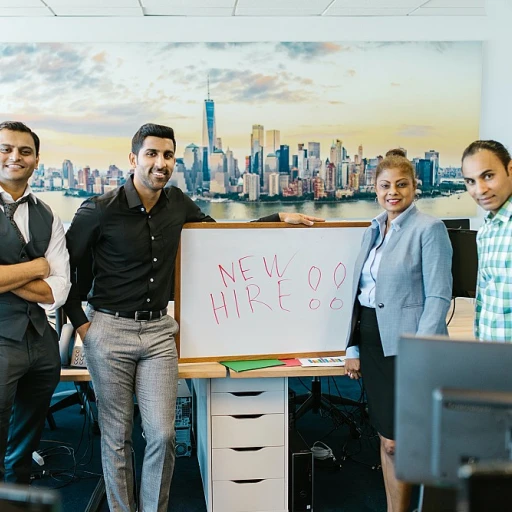
Understanding the Second Chance Business Coalition
Unveiling the Second Chance Business Coalition
The Second Chance Business Coalition (SCBC) is a transformative initiative aimed at reshaping the landscape of employment for individuals with criminal records. This coalition brings together a diverse group of companies committed to providing fair chance employment opportunities. By focusing on inclusive hiring practices, the SCBC seeks to integrate individuals with criminal backgrounds into the workforce, offering them a second chance to rebuild their lives and contribute positively to society.
At the heart of the coalition's mission is the belief that everyone deserves a fair chance at employment, regardless of past mistakes. This initiative not only benefits individuals but also enriches the business community by tapping into a pool of talented and motivated workers. Member companies, including industry giants like JPMorgan Chase, are leading the charge in demonstrating how second chance hiring can be a win-win for both employers and employees.
Through the coalition, businesses can learn from each other and share best practices for integrating second chance employees into their workforce. This collaboration fosters a supportive environment where companies can exchange resources and strategies to overcome common challenges faced by second chance employees. By doing so, the SCBC is paving the way for a more inclusive and equitable job market.
For businesses looking to enhance their employee experience, embracing second chance hiring can be a powerful strategy. Not only does it align with corporate social responsibility goals, but it also brings diverse perspectives and skills into the workplace. As companies continue to explore innovative ways to improve their hiring practices, the SCBC stands as a beacon of hope and progress.
To further understand how effective project management can enhance employee experience, you can explore more about enhancing employee experience through effective project management assistance.
The Importance of Inclusivity in the Workplace
The Role of Inclusivity in Transforming Workplaces
In today's business landscape, the emphasis on inclusivity within the workplace has never been more pronounced. Member companies of the Second Chance Business Coalition are at the forefront of this movement, recognizing that fairness in hiring practices not only transforms lives but also enriches the workplace environment. Inclusive policies aim to create an equitable playing field, granting opportunities to individuals with criminal records who have previously been marginalized in job markets.
When businesses prioritize inclusivity, they acknowledge the diverse experiences that second chance individuals bring to the table. These individuals often have unique perspectives shaped by their past challenges, which can be incredibly valuable to an organization striving for innovative problem-solving and creative thinking. As they are integrated into the workforce, employers like those in the SCBC are learning to embrace and celebrate the diverse backgrounds of their employees.
Second chance hiring not only addresses social inequities, it also presents practical benefits for companies. It expands the talent pool, providing access to a largely untapped workforce. Employers like KeHE and JPMorgan Chase are proving that investing in fair chance employment can lead to a richer, more committed workforce. Additionally, businesses adhering to these inclusive hiring practices may qualify for tax credits, offering further incentives for companies to dismantle barriers to employment.
As inclusivity becomes a core value for companies engaging in second chance hiring, HR resources and educational programs play a critical role. They help ensure that all employees, especially those with criminal records, feel supported and valued within their roles. Organizations committed to these principles can use best practices and strategies shared by coalition members to implement successful second chance employment programs.
Challenges Faced by Second Chance Employees
Overcoming Barriers in the Workplace
Many employers recognize the value of expanding their hiring practices to include individuals with criminal records, but integrating these employees into the workforce presents unique challenges. Addressing these challenges is crucial for both the success of the individuals and the companies involved. One of the main barriers that second chance employees face is the stigma associated with having a criminal record. Employers may harbor biases or misconceptions that can hinder fair evaluation of these job candidates. This can be a significant hurdle for companies seeking to diversify their workforce through second chance hiring practices. Implementing inclusive policies and providing resources to educate the workforce are essential steps in overcoming these biases. Enhancing the employee experience can be pivotal in fostering an open and accepting work environment. Another challenge is the potential lack of recent work experience or gaps in employment history common among second chance employees. Employers can support these individuals by providing training and educational opportunities to help them build the necessary skills for their new roles. Companies like KeHE and member organizations of the Business Roundtable have advocated for offering training and skill development programs, which facilitate smoother transitions back into the workforce. Furthermore, understanding the legal and regulatory requirements surrounding the employment of individuals with criminal records is important for employers. Knowledge of fair chance hiring laws and utilizing the expertise of groups like the Second Chance Business Coalition (SCBC) can help businesses navigate these complexities. This is vital for ensuring compliance and mitigating any potential risks associated with second chance employment. Ultimately, supporting second chance employees requires a commitment to inclusivity and a willingness to challenge existing biases. By implementing best practices and providing adequate resources, companies not only benefit from a broader talent pool but also contribute positively to society by offering second chances to those who need it most. Despite the challenges, businesses like JP Morgan Chase that genuinely invest in such initiatives often find they foster loyalty and gratitude among employees, which can enhance overall workplace dynamics. For more on this topic, explore how expressing gratitude can impact employee engagement and morale.Benefits of Second Chance Hiring for Businesses
Advantages of Embracing Second Chance Hiring
When employing individuals with criminal records, businesses might initially be hesitant due to perceived risks. However, the advantages of second chance hiring often outweigh these preconceptions. Companies that integrate second chance employees benefit in numerous ways, contributing to both workplace diversity and achievement.- Diversified Workforce: Employing a diverse set of individuals with varied backgrounds, such as those with criminal records, can enrich a company’s culture. It fosters an environment where creativity and innovation flourish, propelled by the myriad perspectives that such individuals bring.
- Enhanced Employer Reputation: Demonstrating a commitment to inclusive hiring practices can strengthen a company’s public image. Businesses associated with coalitions like the Second Chance Business Coalition (SCBC) are often perceived as socially responsible, improving their reputation among clients and partners.
- Financial Incentives: Employers may also take advantage of financial benefits such as tax credits when hiring individuals with criminal records. These incentives can make the hiring process economically advantageous while supporting social causes.
- Loyal and Dedicated Employees: Second chance employees often exhibit higher levels of loyalty and dedication. They understand the value of the opportunity they’ve been given and are eager to prove their worth, leading to higher retention rates and reduced hiring costs.
- Positive Impact on Community: By hiring people with criminal backgrounds, companies can participate in rebuilding community ties, offering individuals a path away from recidivism and towards stable employment and growth.
Strategies for Successful Integration of Second Chance Employees
Strategies for Creating a Supportive Environment
Deploying successful strategies for integrating second chance employees into the workforce requires intentionality and an open mindset from employers. Member companies of the Second Chance Business Coalition have shared best practices that illustrate the power of inclusivity in the workplace. Here are some key strategies:- Comprehensive Onboarding and Training: Establishing a robust onboarding process tailored to individuals with criminal records can help ease the transition into the work environment. It’s important to provide thorough training that focuses on both job-specific skills and company culture immersion.
- Mentorship Programs: Pairing second chance employees with mentors in the organization can be highly beneficial. Mentors provide guidance, support, and a clear understanding of the job expectations, while also helping new hires navigate the organizational landscape.
- Continuous Education and Professional Development: Encouraging continuous learning is essential. Employers can offer access to resources such as professional development workshops, which equips second chance employees with the skills needed for career progression, significantly impacting their job satisfaction and loyalty.
- Fair Evaluation Practices: Implementing fair evaluation criteria that are objective and nondiscriminatory ensures that all employees, regardless of past criminal records, are assessed based on their performance and contributions at work.
- Promoting an Inclusive Company Culture: Ensuring an inclusive atmosphere where all voices are valued fosters a sense of belonging for second chance employees. This involves promoting diversity initiatives and encouraging open dialogue about inclusivity within the company.
- Utilizing Tax Credits and Incentives: Governments often offer tax credits and other financial incentives to companies employing individuals with criminal records. Taking advantage of these can support financial sustainability while contributing positively to societal reintegration efforts.











